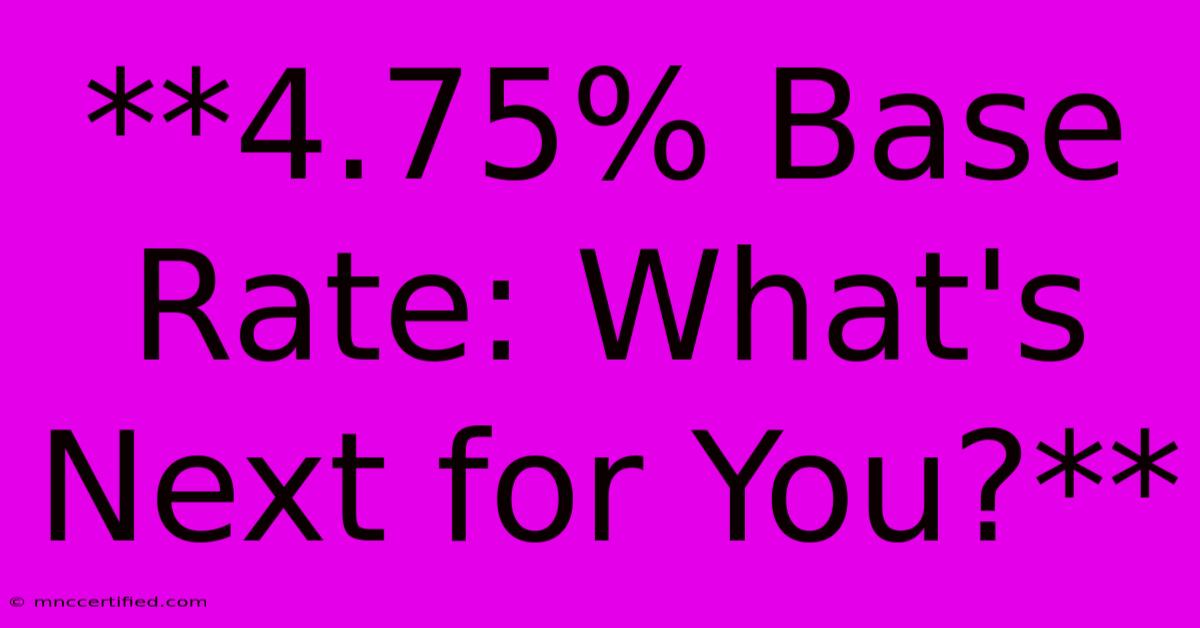**4.75% Base Rate: What's Next For You?**

Table of Contents
4.75% Base Rate: What's Next for You?
The Federal Reserve has raised the base rate to 4.75%, marking the highest level since 2007. This significant move impacts various aspects of our financial lives, from borrowing costs to investment strategies. So, what does this mean for you?
Understanding the Impact of Rising Rates
The base rate, also known as the federal funds rate, is the target interest rate set by the Federal Reserve for overnight lending between banks. When the base rate increases, it generally leads to:
- Higher borrowing costs: This applies to personal loans, mortgages, credit cards, and business loans.
- Increased savings rates: Banks often offer higher interest rates on savings accounts and certificates of deposit (CDs) to attract deposits.
- Potential slowdown in economic growth: As borrowing becomes more expensive, businesses and consumers may reduce spending, potentially impacting overall economic activity.
Navigating Your Finances in a High-Rate Environment
With interest rates rising, it's more important than ever to manage your finances strategically. Here's what you can consider:
1. Reassess Your Debt:
- High-interest debt: Focus on paying down debt with high interest rates, such as credit cards, first. Consider debt consolidation options to potentially lower your monthly payments.
- Fixed-rate loans: If you have fixed-rate loans like mortgages, your monthly payments will remain the same despite rising rates.
- Variable-rate loans: Variable-rate loans, such as some credit cards or home equity lines of credit, will see interest rates adjust based on the base rate. Keep a close eye on your statements and budget accordingly.
2. Review Your Savings Strategies:
- Maximize your returns: Take advantage of higher interest rates on savings accounts and CDs. Consider diversifying your savings portfolio with investments that have potential for growth, such as stocks or bonds.
- Emergency fund: Ensure you have a healthy emergency fund to cover unexpected expenses, especially in times of economic uncertainty.
3. Adjust Your Spending Habits:
- Reduce unnecessary expenses: Identify areas where you can cut back on spending, such as dining out or entertainment.
- Shop around for better deals: Compare rates and terms on loans, credit cards, and insurance policies to find the best value.
- Consider delaying major purchases: If you're planning a big purchase like a car or a house, consider delaying it until rates stabilize or potentially drop.
Looking Ahead
While the current interest rate environment presents challenges, it also offers opportunities. By understanding the impact of rising rates and taking proactive steps, you can navigate this period effectively and position yourself for financial success.
Key Takeaways:
- The Federal Reserve's decision to raise the base rate to 4.75% impacts borrowing costs, savings rates, and economic growth.
- Reassess your debt, review your savings strategies, and adjust your spending habits to adapt to the changing financial landscape.
- Stay informed about economic trends and market conditions to make informed financial decisions.
Remember, consulting with a financial advisor can provide personalized guidance tailored to your unique circumstances.

Thank you for visiting our website wich cover about **4.75% Base Rate: What's Next For You?**. We hope the information provided has been useful to you. Feel free to contact us if you have any questions or need further assistance. See you next time and dont miss to bookmark.
Featured Posts
-
Starbucks Holiday Menu 2024 Full List
Nov 08, 2024
-
Deal Insurance Wilkesboro North Carolina
Nov 08, 2024
-
Aclu Strategy To Counter Trumps Agenda
Nov 08, 2024
-
Guardianship For Life Insurance Purposes
Nov 08, 2024
-
Chelsea Vs Noah Live Stream And Tv Info
Nov 08, 2024